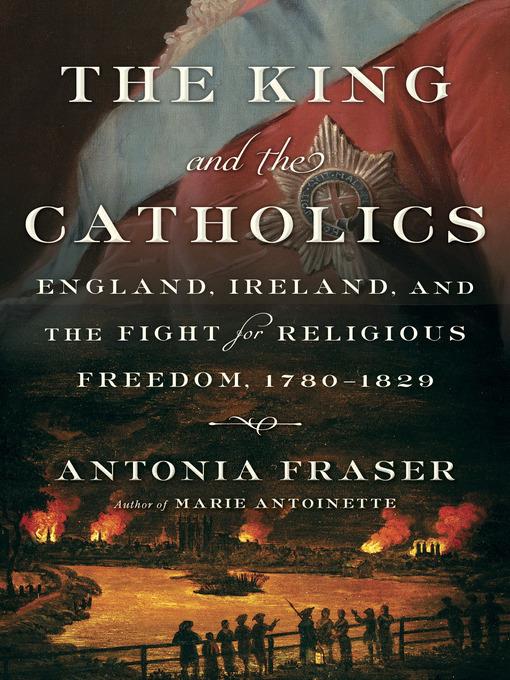
The King and the Catholics
England, Ireland, and the Fight for Religious Freedom, 1780-1829
کتاب های مرتبط
- اطلاعات
- نقد و بررسی
- دیدگاه کاربران
نقد و بررسی

Starred review from July 9, 2018
Fraser (Cromwell) provides a brisk popular history of the fight for Catholic emancipation in England and Ireland. She begins with the Gordon Riots in 1780 and takes readers through the complexities of nearly 40 years of politicking around the question of religious rights in the United Kingdom, leading up to the passage of the Catholic Relief Act in 1829. The Act was designed to ease penalties that had been on Roman Catholics in the United Kingdom since the 17th century. Fraser discusses a variety of these laws—they included restrictions on the ownership of private property and the education of children—and how they affected the Catholic population from peasant to aristocrat. Although some small pieces of legislation to relieve Catholics had been passed prior to 1829, general relief legislation always foundered on resistance in the House of Lords and from monarchs. Fraser traces how the conditions arose in the 1820s to allow this resistance to be overcome, including the convincing of two dedicated opponents of relief, Arthur Wellington and Robert Peel, leaders of the Conservative Party government in the House of Commons. Fraser’s account, which entertains with fine descriptions of London’s heated political and religious climate, will interest any reader of popular histories.

July 15, 2018
Acclaimed popular historian and novelist Fraser (My History: A Memoir of Growing Up, 2015, etc.) rehearses the half-century of maneuvering that culminated in the 1829 liberation of English and Irish Catholics from crushing de jure discrimination.In 18th-century England, Catholics were a thoroughly oppressed minority. Despite the easing of some restrictions in 1778, in the early 19th century, new members of Parliament were required to swear an anti-Catholic oath. How was the government persuaded to pass "An Act for the Relief of His Majesty's Roman Catholic Subjects" (1829), which was, in the words of one Catholic cardinal, "to us what the egress from the catacombs was to the Christians"? Fraser's cast of characters won't surprise readers familiar with the outlines of the story: Her three stars are Irish Catholic activist Daniel O'Connell (who, despite insisting that "ours is a moral not a physical force," likened himself to Simón Bolívar) and, in Downing Street, the Duke of Wellington and Robert Peel, pragmatic politicians who served, respectively, as Prime Minister and Home Secretary. Both eventually championed Catholic Emancipation not out of a sudden love of Rome but because they feared that if they did not, "we must look to civil war in Ireland sooner or later" (as the Duke wrote to Peel in 1824). The supporting cast of anti-Catholic bigots included William Wordsworth, various Archbishops of Canterbury, and Mrs. Arbuthnot, a salon hostess who seems to have stepped out of a Trollope novel (it's disappointing that Fraser didn't make more use of Arbuthnot's pungent two-volume diary). Though marred by the occasional cliché ("these were...fighting words"), Fraser's account is salted with delicious details. For example, speaking in Parliament against emancipation, Attorney-General Charles Wetherell (who may have been drunk) gesticulated so aggressively that his suspenders broke and his pants started to fall down.Not for readers seeking innovative analysis, but a perfectly solid and sometimes-entertaining overview of the great men who brought about vital political change in Britain.
COPYRIGHT(2018) Kirkus Reviews, ALL RIGHTS RESERVED.

September 1, 2018
Acclaimed historian, biographer, and novelist Fraser (Faith and Treason: The Story of the Gunpowder Plot) vividly describes a 50-year period in the struggle for Catholic rights in England and Ireland. Beginning with the Gordon Riots of 1780, which saw London decimated by uprisings against the proposed Catholic Relief Bill to restore the rights of Catholics, and ending with the Roman Catholic Relief Act of 1829, Fraser deftly tells a compelling account of a conflict rooted in religion and politics. While there's no question of the author's view on the struggle (she is herself a Catholic convert), Fraser does not absolve the many English Catholics who looked down on their Irish coreligionists. While recounting the historical facts, Fraser paints portraits of the personalities involved, including King George IV, who fell in love with a Catholic but dared not marry her and was reluctant to give in to Catholic Emancipation since he was supposed to uphold the Protestant Church. VERDICT A gripping telling of the struggle for Catholic rights in England and Ireland that is still relevant and will appeal to all who appreciate a good story about the fight for justice.--Augustine J. Curley, Newark Abbey, NJ
Copyright 2018 Library Journal, LLC Used with permission.

August 1, 2018
Fraser's (My History, 2015) fourteenth work of nonfiction opens with one of the biggest bangs in English history, the extraordinarily destructive Gordon Riots of 1780 protesting the Catholic Relief Act of 1778, which legalized priests, Catholic schools, and Catholic inheritance, balanced only by amending the oath of allegiance to repudiate the pope's temporal authority. Other restrictions still obtained, as did virulent anti-Catholicism. It took 49 years to remove other penalties on Catholics, and the Catholic Question, though never again provoking riots, was very bitterly disputed. George III and George IV believed their coronation oaths required holding fast against Catholic rights, and fear of the newest addition (via the Acts of Union, 1800) to the UK, Ireland, seethed below that opinion. The chief heroes of the long Catholic emancipation campaign were Kerry County Catholic Daniel O'Connell, who insisted on nonviolence, and the Duke of Wellington, the victor of Waterloo, whose insistent political pragmatism finally convinced the king. As she has accomplished with so much modern British history, Fraser makes the story of the Catholic Question's resolution riveting.(Reprinted with permission of Booklist, copyright 2018, American Library Association.)

























دیدگاه کاربران